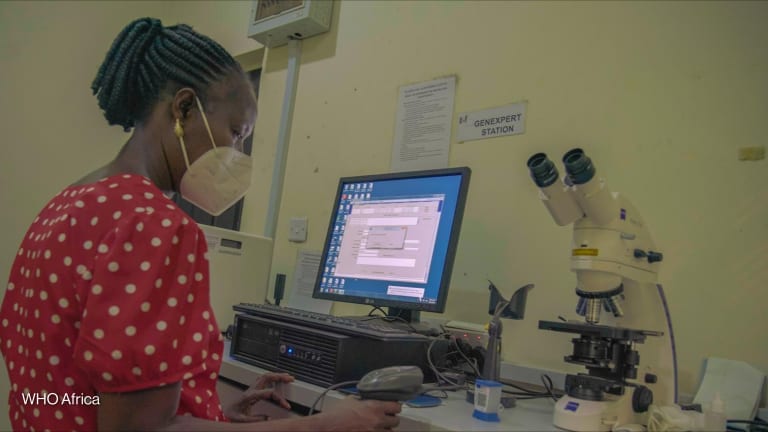Nigeria's lessons on building up a national public health institute
Nigeria Centre for Disease Control is a model country-level public health institution. The continent needs more of these if there is going to be a paradigm shift in how health is managed.
African health leaders are calling for a “new public health order” on the continent, which centers around countries building up domestic capacity to prevent, detect, and respond to outbreaks, as well as lessen the dependence of countries’ health needs abroad. Strong national public health institutes are critical to this, health leaders on the continent said during the first international public health conference for the African continent held this week. One of the model national public health institutes on the continent is the Nigeria Centre for Disease Control. Dr. Chikwe Ihekweazu, its former director general, and currently the World Health Organization’s assistant director-general of health emergency intelligence, outlines the experience of NCDC, emphasizing that now is the time for countries to invest in creating or strengthening existing institutes. “This is not really a time for scratching around at the edges. This is a time for bold and radical changes,” he said. This type of boldness is what led to the creation of the Africa Centres for Disease Control and Prevention in 2017, following the massive Ebola outbreak in west Africa in 2014 through 2016. Africa CDC, hosted by the African Union, serves as a continental body, in the process of developing regional collaborating centers. But the foundation of those regional bodies must be strong country-level public health institutes, Ihekweazu said. “We can't continue to be recipients of knowledge and just implementers of policy. We have to co-develop and offer our knowledge and expertise.” --— Dr. Chikwe Ihekweazu, assistant director-general of health emergency intelligence, WHO Not every African country has a national public health institute — many simply have a ministry of health. And in some countries that have both, there are no clear delineations on the responsibilities of each institute. “I hope [the COVID-19 pandemic] has taught us that quivering between ministries and agencies on who does what needs to stop,” he said. And these institutes need to be properly empowered, through adequate resourcing and proper legal frameworks. “We really have to raise the bar in what a public health agency needs to do for a country,” he said. “It cannot be … at the verges of our government architecture. It has to be at the heart and soul of our existence.” NCDC was a “journey” to set up, he said, that spanned over a decade. The formal presentation of the idea for the institute to the National Council on Health was in 2007, but it was not until 2018 when the act establishing the institute was finally signed into law. While important groundwork was laid during this time, this was also too long a process. “This journey must be shortened in any country that is now trying to do the same,” he said. As a foundation, an enabling legislative framework must be created. This framework must then be translated into strategies that are continually renewed, monitored, and serve as a platform for the institute to act. The strategies should also lead to detailed plans which include deliverables for the institute. “Very often we do this on the side and think: OK, we just need a document that lies on the shelf so we can show our partners that we have a strategy. This is what has to guide our work, and this is what guided the work that we've done at NCDC over the past few years,” he said. In its early days, NCDC began the process of building systems from the ground up. This included creating an integrated laboratory system that delivers both diagnostics and data. A national reference lab and genomic sequencing capacity were built from scratch. NCDC now coordinates over 100 public health labs nationally. It also focused on the digitalization of its surveillance infrastructure so that data analytics, presented in real time, could inform decision-making. “You definitely can't [use data for decision-making] if you're reporting by paper or excel,” he said. “Any new agency — local, regional, national, or global — that is really serious about creating a new order has to join the digital world in how it monitors disease.” NCDC built up its public health supply chain. Ihekweazu said that when he started at the institute five and a half years ago, NCDC had two small store rooms containing a small list of emergency medical items. “By the time I left in October this year, we were running three huge warehouses, supporting a supply chain across Nigeria, with really critical, important commodities needed to respond to the pandemic.” In Nigeria, there were laboratories that had equipment that would break with small technical challenges but there wasn’t the domestic expertise to fix this equipment. To remedy this, NCDC established a small bioengineering team to assist health facilities with repairs. Nigeria had a series of emergency operation centers, which were set up through the polio intervention programs, that were then converted into more general public health emergency centers for every state in Nigeria. This included the creation of rapid response teams that can be deployed for outbreaks. NCDC has also focused on developing guidelines for different diseases and overall knowledge creation, publishing its findings in international scientific journals. “We can't continue to be recipients of knowledge and just implementers of policy. We have to co-develop and offer our knowledge and expertise,” he said. NCDC has grown to a staff of about 500 people in five years. “If we are not developing the right people … we have no chance of success,” he said. “There's only a limited number of evolutionary virologists available, or data scientists, or behavioral scientists, and all of which are core expertise now required in our institutes.” Developing its workforce is a long-term game of developing the expertise needed, such as starting internship programs to train the next generation. And part of this involves increasing salaries, he said, because “if we don't attract and keep the best people, we will not win this fight,” adding that people working in partner agencies often earn several times more than people working in the national public health agencies. “If we are serious about the work we need to do — this cannot continue. We have to pay people better,” he said. Ihekweazu added that funding coming into the institutes — both domestically and internationally — needs to be unrestricted. It cannot be siloed around specific diseases.
African health leaders are calling for a “new public health order” on the continent, which centers around countries building up domestic capacity to prevent, detect, and respond to outbreaks, as well as lessen the dependence of countries’ health needs abroad. Strong national public health institutes are critical to this, health leaders on the continent said during the first international public health conference for the African continent held this week.
One of the model national public health institutes on the continent is the Nigeria Centre for Disease Control. Dr. Chikwe Ihekweazu, its former director general, and currently the World Health Organization’s assistant director-general of health emergency intelligence, outlines the experience of NCDC, emphasizing that now is the time for countries to invest in creating or strengthening existing institutes.
“This is not really a time for scratching around at the edges. This is a time for bold and radical changes,” he said.
This story is forDevex Promembers
Unlock this story now with a 15-day free trial of Devex Pro.
With a Devex Pro subscription you'll get access to deeper analysis and exclusive insights from our reporters and analysts.
Start my free trialRequest a group subscription Printing articles to share with others is a breach of our terms and conditions and copyright policy. Please use the sharing options on the left side of the article. Devex Pro members may share up to 10 articles per month using the Pro share tool ( ).
Sara Jerving is a Senior Reporter at Devex, where she covers global health. Her work has appeared in The New York Times, the Los Angeles Times, The Wall Street Journal, VICE News, and Bloomberg News among others. Sara holds a master's degree from Columbia University Graduate School of Journalism where she was a Lorana Sullivan fellow. She was a finalist for One World Media's Digital Media Award in 2021; a finalist for the Livingston Award for Young Journalists in 2018; and she was part of a VICE News Tonight on HBO team that received an Emmy nomination in 2018. She received the Philip Greer Memorial Award from Columbia University Graduate School of Journalism in 2014.








